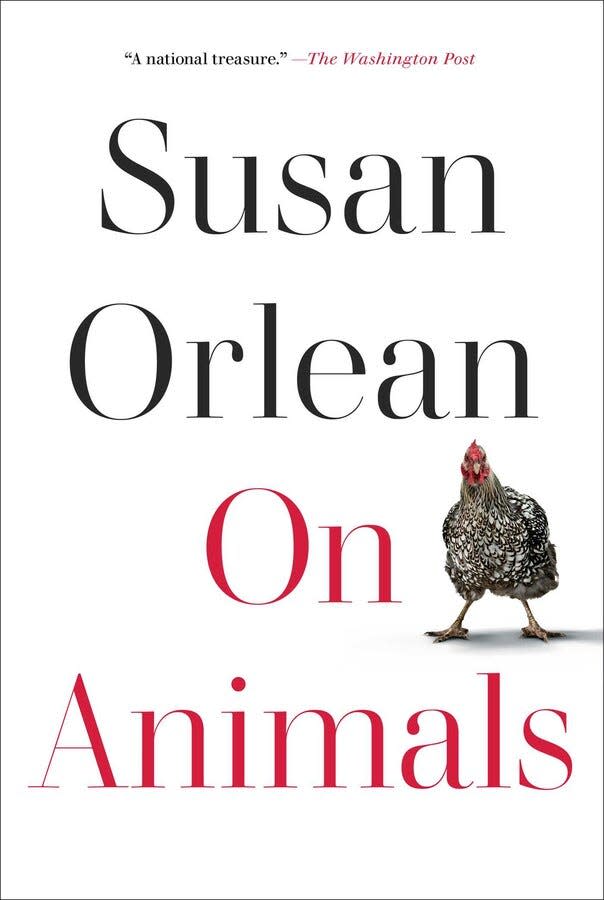'On Animals': In her smart new essay collection, Susan Orlean illuminates the animal world
Susan Orlean brings a fresh buzzword to the cultural conversation when she describes herself as “animalish” in her new collection of essays, “On Animals” (Avid Reader Press, 256 pp., ★★★★ out of four). “I don’t just mean as a child,” she writes, “since all children love animals. I don’t just mean as a young girl … I mean that somehow or other, in whatever kind of life I happened to be leading, animals have always been my style.”
Many of us, feeling caged and pressed by the pandemic into a deeper connection with our pets, have probably never felt more animalish, though the bulk of Orlean’s book is not COVID-19-minded. Its 16 essays date from 1995 to 2020 and were written for The Atlantic, Smithsonian Magazine and, mostly, The New Yorker, where Orlean has been a longtime staff writer.

These include, true to her style, a fine biography of legendary Hollywood dog Rin Tin Tin, and the remarkable journalism that made “The Orchid Thief” a phenomenon. It became source material for the mind-bending, Oscar-winning 2002 Spike Jonze/Charlie Kaufman film, “Adaptation,” a tragicomic dive into American desperation, obsession and consequence, in which Orlean became a picaresque character played by Meryl Streep.
“On Animals” is not so ambitious, though it tends to build, novelistically, through its individual pieces into a broad meditation on how the connections we make or fail to make with animals mark us profoundly along our human journey. Orlean doesn’t pontificate, though; as always, her tone is conversational and self-questioning, as in the book’s first essay, “The It Bird,” from 2009, which explores the American passion, among privileged exurban homeowners, for backyard chickens.
“At first, I thought this chicken fixation was a phase I alone was going through,” she notes, explaining that in the post-Great Recession landscape, “chickens seem to be a perfect convergence of the economic, environmental, gastronomic, and emotional matters of the moment…” Wrangling chickens on her upstate New York acreage, Orlean was happy for their egg-laying and for their clucky profile as “useful and companionable creatures that were lovely and interesting.”
But things get more complicated from there. The essays that follow turn stranger, darker corners of the animalish. There’s Biff Truesdale, a perfect specimen of a boxer show dog whose pampered, pleasure-filled life of first-place finishes and steady work as a $600-per-session stud is a study in canine capitalism. Then there’s the epic “The Lady and the Tigers,” from 2002, which presages the pathological cat-mongering exposed in last year’s Netflix smash, “Tiger King.” In this case, Orlean explores the obsessions and legal woes of a New Jersey tiger hoarder who can’t even keep count of, let alone control, her fabulous, abused beasts.
As for other “animal economies,” as she puts it, Orlean introduces us to the self-preservational stubbornness of mules (“In truth, it is probably a form of genius. A horse will eat until it founders and dies. A mule, though, will only eat as much as it can hold, even if it happens on an open bin of oats”). And so we’re met with Americans who overbid at mule auctions or overbuy on the internet. There are atmospheric takes on Cuban oxen, creepily hilarious reportage on the 2003 World Taxidermy Championships, a forensic account of rabbits falling prey to an outbreak of RHD (rabbit hemorrhagic disease), and a brief reflection on the charisma of the giant panda.
Ultimately, Orlean brings us back to her home turf in “Farmville,” an updated essay originally from 2010 about her family’s Hudson Valley farm, with its growing menagerie of fowl and cattle and its daily struggles, increasingly complicated by the pandemic. Now living in Los Angeles, Orlean may have flown one coop, but she has lost none of her animalishness in peopling another.
This article originally appeared on USA TODAY: Susan Orlean's new book 'On Animals' illuminates the animal world

 Yahoo Movies
Yahoo Movies 